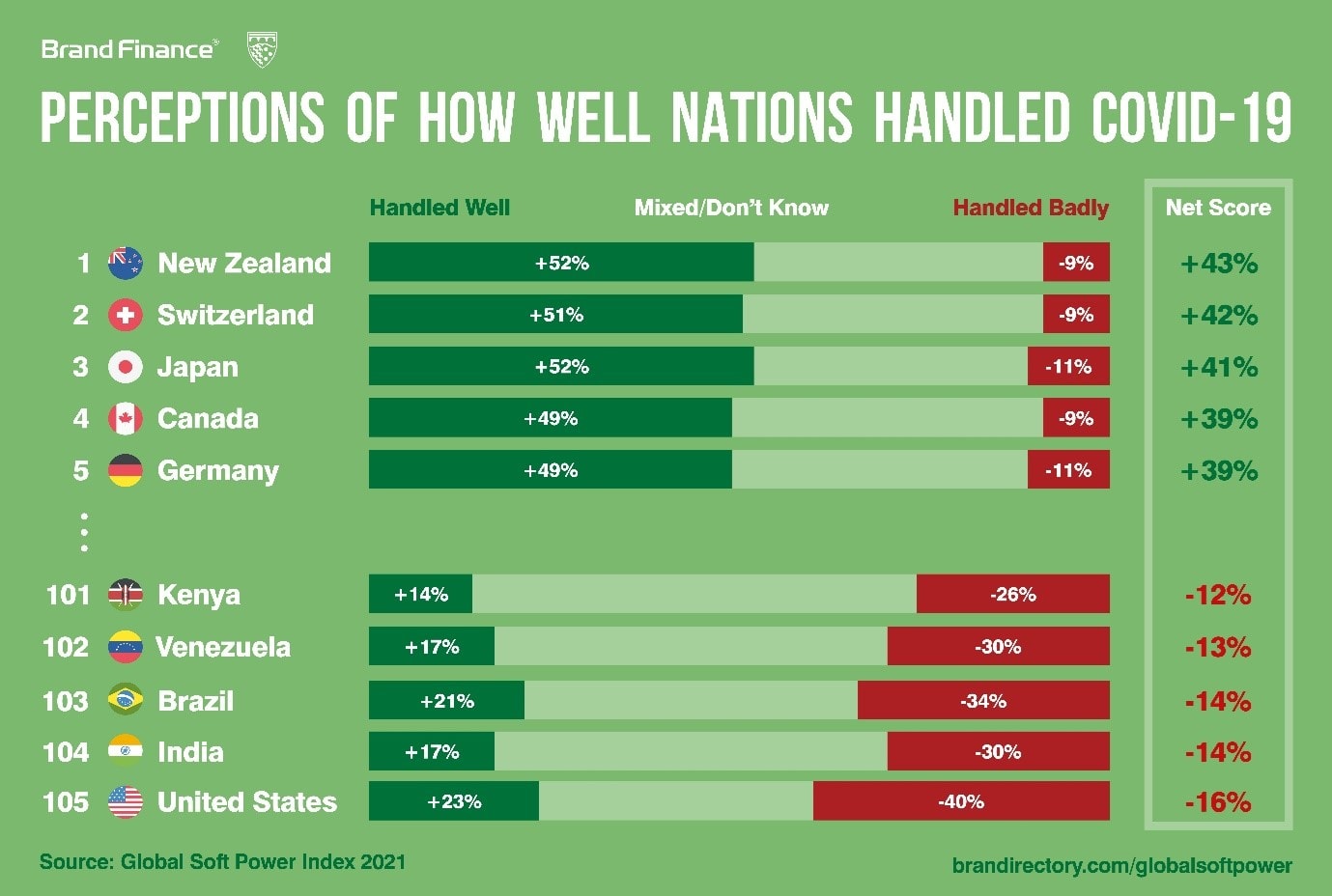In a packed auditorium in London at the presentation of the Soft Power Index by Brand Finance on February 25, 2020 – one of the last big corporate events before the pandemic – a Chinese government official took the microphone to address the keynote speaker, Ban Ki Moon. In a harsh way, he called on the former UN Secretary-General to acknowledge China’s efforts to control the coronavirus spread.
A bit embarrassed, Ban tried to avoid controversy and eventually gave a kind answer, recognising China’s resources to handle the crisis. And raised the issue of other countries not having the same capacity, which would demand international cooperation.
Representatives of other countries who watched the scene didn’t seem sympathetic to their Chinese colleague. At that point, coronavirus was a distant matter for most of them.
And while China saw its image shattered by the virus during that event, the United States had reasons to celebrate its leadership in soft power, which includes among its metrics the existence of an influential and reliable media industry in the country.
Less than a year later and after 2 million Covid-19 deaths across the planet, Brand Finance prepares the next edition of its annual study on perceptions of nations brands, to be revealed in February. But the results of the most comprehensive survey of public opinion on the nation’s handling of Covid-10, part of the Global Soft Power Index, anticipate the damage the coronavirus has done to many nations.
Despite the bad news about censorship in the country, China was not the worse in the eyes of society, ranked 36th among 105 countries. The big looser was the United States, which looks like a punishment for Donald Trump who did not miss an opportunity to criticise the “Chinese virus” during 2020.
But two countries led by women – New Zealand and Germany -, both recognised for transparency in their relationship with the society and the press – were praised respectively by the general public and by specialists (a group formed by journalists, entrepreneurs, political leaders, academics, members of think tanks and non-governmental organisations) as the ones that best handled the pandemic.
Brazil did not perform well. For the 750 specialists interviewed, it has the worst management of the Covid-19 pandemic among the 30 evaluated. For 75,000 members of the public interviewed in more than 100 countries, the country ranked 103rd on a list of 105 nations.
Eduardo Chaves, Brand Finance Latin America Managing Director, reminds us that there were problems widely publicised by the largest media outlets in the world, which influenced Brazil’s negative assessment. He also observes that the nations with worse performance – the United States, India and Brazil have large populations and therefore appears with a high absolute number of deaths compared to other smaller countries.
Nevertheless, the report shows how good or bad the perception is. It will not be easy for the most affected to recover what the pandemic has taken from them.
A summary of Brand Finance’s research
- Brand Finance asked 75,000 respondents from the general public and 750 from specialist audiences about the handling of COVID-19 by 105 nations worldwide. The respondents were asked to rate the nations’ efforts in terms of stimulating the economy, protecting the health and wellbeing of citizens, as well as cooperating on the international stage and providing aid.
General Public
- Hailed as a global success story in the combat of COVID-19, New Zealand has been rated by the general public as the country that best handled the pandemic, with a net score of +43%.
- The net score is the difference between ‘handled it well’ and ‘handled it badly’ responses across the three measures (economy, health & wellbeing, and international aid & cooperation). Prime Minister Jacinda Ardern’s swift response and clarity of communication in handling the crisis has been widely praised by the media and recognised by people the world over.
- At the other end of the spectrum, ranking bottom among 105 nations globally, the United States has a regretful net score of -16%, certainly a contrast to how strongly the US performed on other metrics in last year’s Global Soft Power Index 2020 survey. President Donald Trump’s response to the pandemic has been causing controversy both at home and abroad, with the president repeatedly refusing to acknowledge and act on the severity of the situation. With the most cases and COVID-19-related deaths globally, the world’s largest and strongest economy has encountered harsh criticism and questioning on the global stage.
David Haigh, CEO of Brand Finance, commented:
“The stark contrast between the public’s perceptions of how New Zealand and the US handled the pandemic, epitomises the two nations’ contrasting visions of the world, spearheaded by almost polar-opposite leaders. On the one hand, we have Ardern’s open, liberal, and compassionate policies versus Trump’s often combative, protectionist, and isolationist approach. With President-Elect Joe Biden getting ready to take the reins of power next year, all eyes will be on him to kickstart recovery across the nation.”
Other Western powerhouses’ weaknesses have also been displayed for the world to see during the pandemic, and their failings have not gone unnoticed by the general public respondents.
France (+15%), United Kingdom (+14%), Spain (+4%), and Italy (-1%), all record particularly low net scores. The UK in particular has struggled to negotiate the ongoing repercussions from the pandemic, including the fallout from the sharpest economic contraction on record – 20.4% in April this year, leaving the nation in a state of turmoil. The UK, Spain, and Italy are currently within the top 10 highest mortality rates per 100,000 in the world, with Italy recording the highest mortality rates per 100,000 among the three at 102.16.

- Many affluent nations with a strong reputation of being well-run, have emerged as apparent role models in crisis management in the eyes of the public, often regardless of their approaches to handling the pandemic. Strong net scores above +35% were noted by nations such as Switzerland, Japan, Canada, Finland, Norway, Singapore, Denmark, South Korea, Australia, Austria, and Sweden.
- Sweden – a nation that was particularly controversial in its COVID-19 response, snubbing the lockdown consensus and imposing comparatively relaxed restrictions and policies in pursuit of herd immunity – has a troubling 8th highest incidence of deaths per 100,000 in the European Economic Area. However, the general public and specialist audiences both rank Sweden a high 13th globally for its handling of the pandemic across all three measures.
- Japan has defied the odds of many that expected the nation to be one of the worst-hit at the beginning of the COVID-19 outbreak – due to its proximity to China, its densely populated cities, and burgeoning elderly population. But it has emerged as relatively successful, with lower Coronavirus cases and deaths and with its economy faring better.
- At the same time, many other nations do not receive enough credit for their efforts where credit is clearly due. Vietnam’s score is just +8%, despite recording staggeringly low COVID-19 cases and deaths. The story is the same for Slovakia with a net score of only +5%, but with far fewer cases than its European counterparts and a successful mass asymptomatic testing programme, which countries like the UK are hoping to replicate, the nation nonetheless falls far lower down the ranking than expected.
- The UAE is the highest-ranked nation in the survey across the Middle East, and 14th globally, with a net score of +33%. The nation’s efforts, from international aid to vaccine development, have meant the UAE is perceived to have handled the pandemic better than its neighbours, Qatar and Saudi Arabia, with net scores of +29% and +24% respectively. The nation’s lower levels of familiarity, compared to nations like Switzerland, Denmark, and Austria seems to be a limiting factor, however.
Specialist audience
- According to the specialist audiences, in turn, it was Germany that has come out on top as the country that has handled COVID-19 best, with a net score of 71%. New Zealand was ranked 3rd by specialist audiences with a net positive score of 57%. Compared to the general public, the specialist audiences have understood and recognised the greater challenge that Germany has faced throughout the pandemic, as a nation with a much larger population and shared borders with several other nations, unlike New Zealand.
- For the most part, the German government’s and Chancellor Angela Merkel’s response to the pandemic has been received positively both domestically and internationally and the numbers support this with the country recording consistently lower cases per 100,000 than its Western European counterparts.
China praises WHO
- Overall, 31% of respondents believe WHO ‘handled it well, compared to 20% who believed it was ‘handled badly’.
- Chinese respondents were the most complimentary of WHO’s handling of the crisis, with a net positive response of +53% of respondents saying the organisation ‘handled it well. At the other end of the spectrum, Japanese respondents were the least complimentary, with a net negative response of -51% of respondents saying the organisation ‘handled it badly’
Full General Public results for COVID-19 question
| Rank | Nation | Net Index Score | Rank | Nation | Net Index Score | |
| 1 | New Zealand | 43% | 53 | Morocco | 9% | |
| 2 | Switzerland | 42% | 54 | Poland | 9% | |
| 3 | Japan | 41% | 55 | Hungary | 9% | |
| 4 | Canada | 39% | 56 | Bangladesh | 9% | |
| 5 | Germany | 39% | 57 | Angola | 9% | |
| 6 | Finland | 38% | 58 | Uganda | 8% | |
| 7 | Norway | 38% | 59 | Vietnam | 8% | |
| 8 | Singapore | 37% | 60 | Indonesia | 8% | |
| 9 | Denmark | 37% | 61 | Egypt | 7% | |
| 10 | South Korea | 37% | 62 | Chile | 7% | |
| 11 | Australia | 37% | 63 | Pakistan | 7% | |
| 12 | Austria | 36% | 64 | Ethiopia | 7% | |
| 13 | Sweden | 35% | 65 | Croatia | 6% | |
| 14 | United Arab Emirates | 33% | 66 | South Africa | 6% | |
| 15 | Netherlands | 32% | 67 | Uzbekistan | 6% | |
| 16 | Qatar | 29% | 68 | Cambodia | 6% | |
| 17 | Belgium | 28% | 69 | Peru | 6% | |
| 18 | Iceland | 24% | 70 | Lithuania | 5% | |
| 19 | Estonia | 24% | 71 | Slovakia | 5% | |
| 20 | Saudi Arabia | 24% | 72 | Trinidad & Tobago | 4% | |
| 21 | Russia | 21% | 73 | Bolivia | 4% | |
| 22 | Slovenia | 20% | 74 | Myanmar | 4% | |
| 23 | Portugal | 19% | 75 | Senegal | 4% | |
| 24 | Azerbaijan | 19% | 76 | Algeria | 4% | |
| 25 | Jordan | 18% | 77 | Lebanon | 4% | |
| 26 | Luxembourg | 18% | 78 | Spain | 4% | |
| 27 | Czech Republic | 18% | 79 | Ghana | 3% | |
| 28 | Oman | 17% | 80 | Tanzania | 2% | |
| 29 | Israel | 16% | 81 | Nepal | 2% | |
| 30 | France | 15% | 82 | Dominican Republic | 1% | |
| 31 | Malaysia | 15% | 83 | Iraq | 1% | |
| 32 | Kuwait | 15% | 84 | Nigeria | 0% | |
| 33 | United Kingdom | 14% | 85 | Tunisia | 0% | |
| 34 | Greece | 14% | 86 | Bulgaria | 0% | |
| 35 | Turkmenistan | 13% | 87 | Argentina | 0% | |
| 36 | China | 13% | 88 | Ukraine | 0% | |
| 37 | Turkey | 13% | 89 | Ecuador | 0% | |
| 38 | Bahrain | 13% | 90 | Colombia | -1% | |
| 39 | Uruguay | 13% | 91 | Jamaica | -1% | |
| 40 | Latvia | 12% | 92 | Cuba | -1% | |
| 41 | Kazakhstan | 12% | 93 | Italy | -1% | |
| 42 | Sri Lanka | 12% | 94 | Honduras | -1% | |
| 43 | Serbia | 10% | 95 | Romania | -3% | |
| 44 | Costa Rica | 10% | 96 | Guatemala | -4% | |
| 45 | Panama | 10% | 97 | Congo | -4% | |
| 46 | Coted’Ivoire | 10% | 98 | Mozambique | -5% | |
| 47 | Ireland | 10% | 99 | Iran | -5% | |
| 48 | Zambia | 10% | 100 | Mexico | -9% | |
| 49 | Cameroon | 10% | 101 | Kenya | -11% | |
| 50 | Thailand | 10% | 102 | Venezuela | -13% | |
| 51 | Philippines | 9% | 103 | Brazil | -14% | |
| 52 | Paraguay | 9% | 104 | India | -14% | |
| 105 | United States | -16% |













